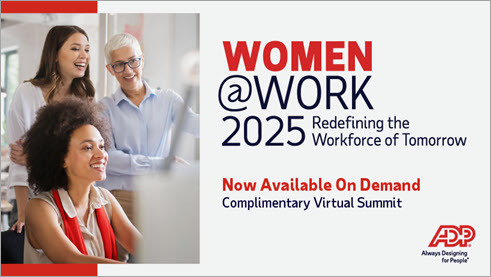From Gaps to Gains — Getting Real on Closing the Skills Gap
Part of a series | Women@Work Series

During the skills-focused panel discussion at ADP's 5th annual Women@Work virtual summit, experts from a variety of industries talked about practical ways you can close the skills gap in your workforce.
Women@Work is an annual, complimentary virtual summit that brings together leaders and change-makers from around the world to discuss what's shaping the future of work. From the transformative power of generative artificial intelligence (AI) to innovative approaches in skills-based talent management and leadership development, the summit offers valuable insights for everyone. Watch the entire program on demand for practical strategies that can elevate your organization. In the skills-focused session, speakers Kyle Lagunas, head of strategy and principal analyst at Aptitude Research, Asal Naraghi, global innovation leader for ADP's Future of Work and Krista Voorhees, vice president of business operations at Thrive Restaurant Group, shared tips and insights on closing the skills gap.
The skills conundrum
According to recent ADP Research, less than one in four people feel they have the skills to advance in their career. Despite this alarming number, fewer than 4% of employers upskill their employees within the first two years of employment. Could this be because many organizations don't know where to start when it comes to skills?
Lagunas says, "Even the most confident companies are still struggling to validate and define skills, let alone put out skills training programs for their employees. Even though the idea of upskilling is cool, there's still a lot of basic work to be done when it comes to skills."
Determine the skills that align with your business strategy
"Closing the skills gap" is a great concept, but without strategically determining which skills are important for the well-being, growth and success of your organization, general upskilling won't have much positive impact. Lagunas encourages HR leaders not to get lost in doing more when it comes to skills and instead to define what skills their organization truly needs to succeed. "Connecting skills-based strategies with your organization's business strategy is crucial; otherwise, it just becomes more HR stuff."
"What gets measured gets done."
One of the most important parts of closing the skills gap is measurement — both the measurement of existing skills and the measurement of needed skills. Defining where your people are and defining where they need to be creates a concrete target for your organization. And once there's a real target in place, then you can start with the training programs, apprenticeships, mentorships and the development that's needed to bring people up. Without data and measurement, it's impossible to learn where your people are, let alone whether they're gaining and becoming proficient at new skills. As Naraghi puts it, "What gets measured gets done."
A personalized approach to learning
Once skills have been defined and measurement protocols put in place, then you can get down to the nitty gritty steps to help your people learn the skills they need. Whether your organization is larger and needs to bring in a third party to help teach computer literacy skills or you're a smaller organization and want to put on a workshop on professional communication or generative AI prompt engineering, there are many ways to equip your people with the skills they need. One thing Voorhees says is important in the process, regardless of methodology, is personalization. No matter your organization's size, when skills development is personal and tailored to an individual employee or employee group, it helps create more buy-in and a better value proposition. "We take a really personalized approach to each employee when it comes to skills and development, and I think you really have to do that in order to move forward," says Voorhees.
"Closing the skills gap" is a great concept, but without strategically determining which skills are important for the well-being, growth and success of your organization, general upskilling won't have much positive impact.
Kyle Lagunas, Head of Strategy and Principal Analyst, Aptitude Research
The importance of psychological safety
Learning new skills can be nerve-wracking for some people, so approaching the process with grace and patience is a huge part of setting up your teams for success. "Continuous improvement thrives in environments where people feel like it's okay to take risks and voice ideas that might be new or fresh without fear," says Lagunas.
Without establishing an environment that's psychologically safe, employees may be less likely to try their hand at a new skill. It's important to remember that no one is an expert the first time they do something, so creating a culture of progress over perfection will help give your people the confidence and comfort they need when learning new skills.
The wrap-up
Lagunas, Naraghi and Voorhees covered many more insights on skills and shared inspiring tips. Watch the entire Women@Work session on demand.




